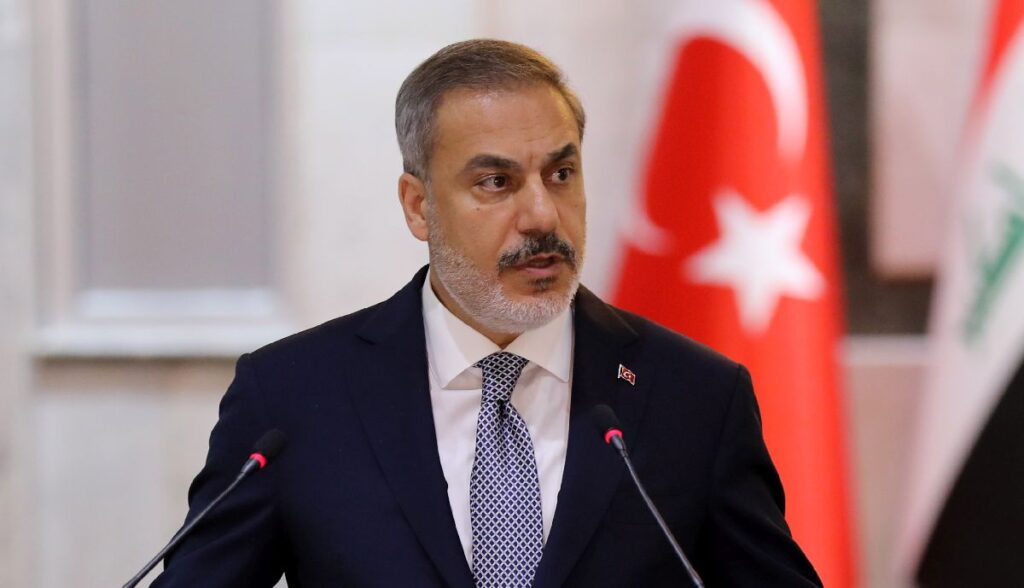Following developments with the Turkey-Libya memorandum and Greek Foreign Minister Gerapetritis’s urgent visit to Libya on Sunday, Athens faces a new challenge from Turkey. Hakan Fidan is reportedly in advanced discussions for establishing an EEZ with Syria, whose interim leader, Ahmed al-Sharaa, was personally backed by Turkish President Recep Tayyip Erdogan himself.
New Turkish provocation: Potential EEZ agreement with Syria
The news comes to light through Nordic Monitor, which publishes the Turkish Foreign Minister’s letter proving the existence of secret Turkey-Syria negotiations for establishing maritime zones between Turkey and Syria, following the overthrow of the Assad regime.
Revealing Fidan letter: Secret Ankara-Damascus negotiations
The letter, obtained by Nordic Monitor, reveals that multiple Turkish state agencies have been ordered to draft an Exclusive Economic Zone (EEZ) agreement with Syria. The goal is to protect the interests of both Turkey and the pseudo-state.
“With the overthrow of the Baath regime (i.e., Bashar al-Assad’s party) and the transfer of power to a transitional government, efforts are being made in coordination with our relevant institutions to determine maritime borders with Syria and delineate maritime jurisdiction areas beyond territorial waters, in a way that protects our country’s rights and interests,” Fidan wrote in the letter, dated June 16, addressed to the Office of the President of the Turkish Parliament.
Fidan also emphasized that Turkey has committed to defending the pseudo-state’s rights and interests in any future maritime delimitation agreement with Damascus. The letter constitutes the first official confirmation that preparations for such a maritime agreement are already underway – despite previous public statements by Turkey’s Transport Minister that suggested Ankara was considering such an agreement only as a future possibility.
Fidan also dismissed claims that Turkey had committed not to pursue a maritime agreement with Syria during his January 12, 2025 meeting in Riyadh with Kaja Kallas, the European Union’s High Representative for Foreign Affairs and Security Policy and Vice-President of the European Commission. “It would be beneficial to take into account our ministry’s official statements and declarations on this matter,” Fidan writes in the letter, adding: “The EU has no right to comment on a potential agreement between two sovereign states regarding their maritime jurisdiction areas.”


Impact on Eastern Mediterranean geopolitical landscape
A Turkish-Syrian maritime agreement could significantly alter the geopolitical dynamics of the Eastern Mediterranean, which has emerged in recent years as a flashpoint for regional disputes and tilts the balance in favor of Turkey. The discovery of rich hydrocarbon deposits beneath the seabed has led to overlapping claims from multiple coastal states, with Turkey at the center of disputes involving Greece, Cyprus, and Egypt.
Given the complex situation, any agreement between Turkey and Syria could further escalate tensions between Ankara and EU member states Greece and Cyprus, leading Brussels into yet another confrontation with the long-problematic EU candidate country.
Turkey appears to be exploiting a strategic opportunity in post-Assad Syria, led by President Ahmed al-Sharaa, with whom Turkish officials have engaged in long-term, albeit secretive, cooperation. Since the beginning of the Syrian civil war in 2011, Turkey has supported and armed various jihadist groups in an attempt to overthrow Assad.
It’s worth noting that Ankara had previously attempted to reach a maritime zone delimitation agreement with the Assad government, but these efforts were derailed by the outbreak of the Syrian conflict in 2011. This time, a successful agreement would not only formalize Turkey’s maritime borders with Syria, but would also strengthen Ankara’s legitimate claims in the region, offer de facto recognition to the Cyprus pseudo-state, and potentially open new areas for energy exploration.
The agreement could also pave the way for joint exploration and exploitation of cross-border hydrocarbons by Turkey and Syria. Given that Damascus currently lacks the capability to conduct offshore drilling, Ankara would likely lead the technical and operational efforts under such an agreement.
However, the proposed agreement is expected to further complicate Turkey’s relations with both Greece and Cyprus, as well as with Israel and Lebanon. Turkey has long opposed the maritime delimitation agreements that Cyprus signed with Egypt in 2003, Lebanon in 2007, and Israel in 2010, arguing that these agreements violate the pseudo-state’s rights. Ankara and the pseudo-state have also criticized Nicosia’s decision to grant exploration licenses for offshore hydrocarbon blocks.
Libya model
Turkey appears to be following a similar blueprint to what it used with Libya’s Government of National Accord (GNA), which resulted in a controversial 2019 maritime agreement, commonly known as the Turkey-Libya memorandum. This agreement dramatically escalated tensions with both Greece and the European Union. In response to the Turkey-Libya maritime memorandum, the European Council declared on December 12, 2019, that the agreement violates the sovereign rights of third states, does not comply with the United Nations Law of the Sea, and cannot produce legal consequences for third states.




